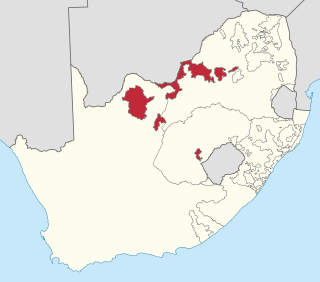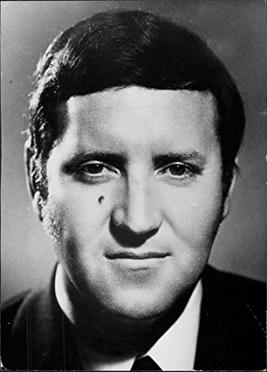Related Research Articles
The Republic of South Africa is a unitary parliamentary democratic republic. The President of South Africa serves both as head of state and as head of government. The President is elected by the National Assembly and must retain the confidence of the Assembly in order to remain in office. South Africans also elect provincial legislatures which govern each of the country's nine provinces.

Bophuthatswana, officially the Republic of Bophuthatswana, and colloquially referred to as the Bop and by outsiders as Jigsawland was a Bantustan that was declared (nominally) independent by the apartheid regime of South Africa in 1977. However, like the other Bantustans of Ciskei, Transkei and Venda, its independence was not recognized by any country other than South Africa.

A Bantustan was a territory that the National Party administration of South Africa set aside for black inhabitants of South Africa and South West Africa, as a part of its policy of apartheid.

General elections were held in South Africa between 26 and 29 April 1994. The elections were the first in which citizens of all races were allowed to take part, and were therefore also the first held with universal suffrage. The election was conducted under the direction of the Independent Electoral Commission (IEC), and marked the culmination of the four-year process that ended apartheid.

Kgosi Lucas Manyane Mangope was the leader of the Bantustan (homeland) of Bophuthatswana. The territory he ruled over was distributed between the Orange Free State – what is now Free State – and North West Province. He was also the founder and leader of the United Christian Democratic Party, a political party based in the North West of South Africa.

The United Christian Democratic Party is a minor political party in South Africa. It was founded by Lucas Mangope, leader of the Bophuthatswana bantustan in 1997, as a successor to the Tswana National Party, and led by him for the first fifteen years of its existence. Mavis Matladi was elected as its leader on 29 January 2011 after the expulsion of Mangope. Matladi died in December 2011. Isaac Sipho Mfundisi was elected president on Saturday, 7 January 2012.

North West is a province of South Africa. Its capital is Mahikeng. The province is located to the west of the major population centre and province of Gauteng and south of Botswana.

Elections in Angola take place within the framework of a multi-party democracy. The National Assembly is directly elected by voters, while the leader of the party or coalition with the most seats in the National Assembly automatically becomes President.

The National Assembly is the directly elected house of the Parliament of South Africa, located in Cape Town, Western Cape. It consists of four hundred members who are elected every five years using a party-list proportional representation system where half of the members are elected proportionally from nine provincial lists and the remaining half from national lists so as to restore proportionality.

Elections in Namibia determine who holds public political offices in the country. Namibia is a semi-presidential representative democratic republic. It runs direct elections every five years for the position of the president and seats in the National Assembly, and every six years for the Regional Councils and the distribution of seats in local authorities. The National Council is elected indirectly by the constituency councillors of Namibia's 14 regions.

Elections in Zambia take place within the framework of a multi-party democracy and a presidential system. The President and National Assembly are simultaneously elected for five-year terms.

The National Assembly is the unicameral legislative body of the Republic of Cabo Verde.

The system of racial segregation and oppression in South Africa known as apartheid was implemented and enforced by many acts and other laws. This legislation served to institutionalize racial discrimination and the dominance by white people over people of other races. While the bulk of this legislation was enacted after the election of the National Party government in 1948, it was preceded by discriminatory legislation enacted under earlier British and Afrikaner governments. Apartheid is distinguished from segregation in other countries by the systematic way in which it was formalized in law.

The 1994 Bophuthatswana crisis was a major political crisis which began after Lucas Mangope, the president of Bophuthatswana, a nominally independent South African bantustan created under apartheid, attempted to crush widespread labour unrest and popular demonstrations demanding the incorporation of the territory into South Africa pending non-racial elections later that year. Violent protests immediately broke out following President Mangope's announcement on 7 March that Bophuthatswana would boycott the South African general elections. This was escalated by the arrival of right-wing Afrikaner militias seeking to preserve the Mangope government. The predominantly black Bophuthatswana Defence Force and police refused to cooperate with the white extremists and mutinied, then forced the Afrikaner militias to leave Bophuthatswana. The South African military entered Bophuthatswana and restored order on 12 March.
Like South Africa's eight other provinces, the Northern Cape is governed by a parliamentary system, in which the Premier of the Northern Cape is elected by the Northern Cape Provincial Legislature and in turn selects the Northern Cape Executive Council. As in most other provinces, the African National Congress (ANC) has led the Northern Cape Provincial Government since the end of apartheid. In the most recent provincial election, held in 2019, the ANC won 18 of 30 seats in the provincial legislature and the Democratic Alliance was the official opposition in the legislature. Pursuant to the same election, Zamani Saul was elected Premier of the province.
Parliamentary elections were held in Bophuthatswana on 4 October 1972. The Bophuthatswana National Party led by Lucas Mangope won 20 of the 24 elected seats in the Legislative Assembly.
Parliamentary elections were held in Bophuthatswana between 22 and 24 August 1977. The Bophuthatswana Democratic Party won 43 of the 48 elected seats in the National Assembly.
Parliamentary elections were held in Bophuthatswana in October 1982. The Bophuthatswana Democratic Party won all 72 of the elected seats in the National Assembly.

Rowan Cronjé was a Rhodesian politician who served in the cabinet under prime ministers Ian Smith and Abel Muzorewa, and was later a Zimbabwean MP. He emigrated to South Africa in 1985 and served in the government of Bophuthatswana.
Kgomotso Paul Harry Ditshetelo was a South African politician who represented the United Christian Democratic Party (UCDP) in the National Assembly from 1999 to 2009. He was also the deputy president of the UCDP from 1998 to 2011. During apartheid, he was a politician and civil servant in Bophuthatswana.
References
- 1 2 3 Elections in South Africa's Apartheid-Era Homelands "Bantustans" African Elections Database